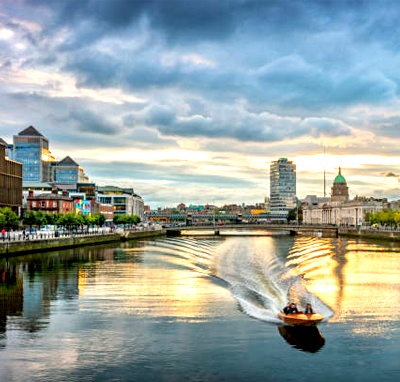Studying In Ireland

The international dimension of education is important in Ireland, which has one of the most trade dependent economies in the world. The Irish Government has invested in the internationalisation of our education system, both to promote the international activities and linkages of our colleges and to encourage students from overseas countries to study in Ireland.
Higher education in Ireland is judged by international standards and the employment market for graduates is a global one. Overseas students receive a quality education in a friendly environment. They in turn enrich the educational experience of our own students and bring an international dimension to our campuses. Lifelong friendships and networks are formed between Irish and overseas students which later enhance the cultural and trade relationships between our countries

Why Ireland?
Ireland has a long and honourable tradition in education. As a result of a sustained investment in this area Ireland now has one of the highest educational participation rates in the world - 81% of Irish students complete second-level and approx 50% go on to higher education. This dynamic, educated population has made its mark at home and abroad with international companies looking to Ireland for hiring graduates for top notch positions.
The responsibility for education lies within the Department of Education and Science. It administers all aspects of education policy including curricula, syllabi and national examinations. Attendance at full time education is compulsory in Ireland from six to fifteen years of age and is free in the majority of schools, and at undergraduate third-level. Education is considered a fundamental right under the Irish constitution.
For more detailed information contact:
The Department of Education and Science Marlborough Street Dublin 1 Tel: +353 1 8734700 Fax:+353-1-878 6712 Website: http://www.education.ieEducation System in Ireland
Higher Education
Higher Education in Ireland consists of the universities (with associated colleges of education), institutes of technology, and a number of private independent colleges. The universities and institutes of technology are autonomous and self-governing, but are substantially state-fundedUniversities
There are nine universities in Ireland – 2 in Northern Ireland and 7 in the Republic. The University of Dublin , Trinity College (TCD), founded in 1592, is the oldest university in Ireland . The National University of Ireland (NUI) is a federal institute consisting of four constituent universities; University College Dublin, National University of Ireland Dublin; University College Cork, National University of Ireland Cork; National University of Ireland Galway and National University of Ireland Maynooth. NUI also has three recognised colleges: National College of Art and Design (NCAD), The Royal College of Surgeons in Ireland (RCSI) and St. Angela’s College of Education . The University of Limerick (UL) and Dublin City University (DCU) are our newest universities and were founded in 1989. The two universities in Northern Ireland are: the University of Ulster (UU) and the Queen’s University of Belfast (QUB). In addition to offering degrees at Bachelors, Masters and Doctorate levels, over a full range of disciplines, the universities and colleges also undertake research in many areas. Undergraduate and postgraduate diplomas are also available and universities are involved in continuing and distance education programmes (aimed mainly at Irish residents).Institutes of Technology
There are currently 14 Institutes of Technology located throughout the Republic offering programmes at degree, national diploma and national certificate levels in a wide variety of subjects. Their qualifications are externally validated by Ireland’s national certification authority, which ensures that their qualifications reach the highest international standards. Many of the Institutes of Technology also run postgraduate diploma and degree programmes, both taught and research.Colleges of Education
There are five Colleges of Education for primary school teachers. These colleges offer three year full time courses leading to a B.Ed degree which is the recognised qualification for primary school teaching.Independent Third Level Colleges
These colleges offer programmes leading to certificates, diplomas and degrees, which have received recognition by Ireland’s national certification authority or from other external accreditation institutions (such as universities). Courses on offer include: Accountancy and Business Studies, Law, Humanities, Hotel & Catering, Tourism Studies and Art. The third level education system in Ireland is broad in scope and encompasses the university sector, the technological sector, the colleges of education and private, independent colleges. The first three groupings, which comprise 34 institutions, are autonomous and self-governing, but are substantially state funded. The numbers participating in higher education in Ireland have increased significantly in recent decades with an estimated 55 percent of second level students now going on to higher education – one of the highest participation rates in the world. Entry to third level education for Irish students is based upon performance in the final secondary school examination, the Leaving Certificate. Entry requirements for overseas students are determined individually by each institution and are generally based on national examination performance and English language aptitude. The universities in Ireland and the Dublin Institute of Technology confer academic awards on successful students in their own colleges. Most non-university colleges receive academic qualifications from the Higher Education and Training Awards Council HETAC which was established by the Government in June 2001, under the Qualifications (Education and Training) Act 1999.Hetac awards qualifications and sets and monitors standards at all levels of higher education and training up to PhD level. The quality and standard of Irish educational awards is fully recognised globally. All Irish awards are included in the national framework of qualifications maintained by the National Qualifications Authority of Ireland http://www.nqai.ieThe following academic awards can be achieved at Irish third level institutions:
- One-Year Certificate: One year full-time course
- National Certificate: Two year full time course
- National Diploma: One year after National Certificate/ 3 years in total
- Bachelors Degree: Normally a three or four year course
- Graduate Diploma: Designed for graduates seeking a vocational reorientation - usually a one year course
- Masters degree: Either by research or through a taught programme. Normally one-two year(s) duration
- Doctorate (PhD): Usually takes a minimum of three years of original research
Student Expenses
The main costs that students can expect to incur while in Ireland include fees*, accommodation and living expenses. These vary considerably depending on the course, the institution and the lifestyle of the student.*Third level education in Ireland is free for students who are:
- first-time undergraduates and,
- are E.U. nationals and have been ordinarily resident in an E.U. Member State for at least three of the five years preceding their entry to an approved third-level course.
The universities and colleges have a small number of scholarships for overseas students. Students are advised to contact the institution directly to obtain further information.
Application Procedures
Studying overseas is a very enriching experience however it can be quite costly, hence it is worth spending time and consideration choosing the most suitable programme and most appropriate institution.
Apart from the universities in Northern Ireland, application for most full-time undergraduate courses is made through a Central Applications Office (CAO). The CAO provides an applications pack with a handbook which lists all the courses on offer and gives information on how to apply.
The CAO website is : www.cao.ie
